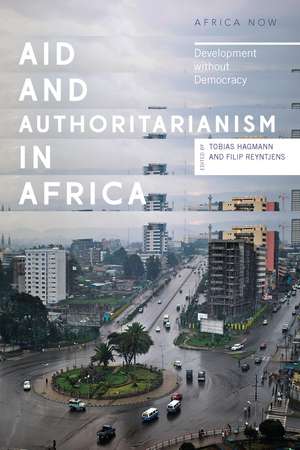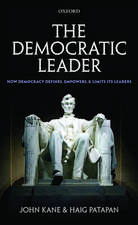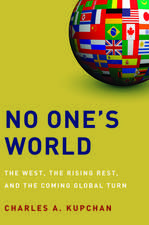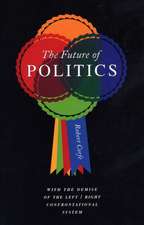Aid and Authoritarianism in Africa: Development without Democracy: Africa Now
Editat de Tobias Hagmann, Filip Reyntjensen Limba Engleză Paperback – 14 mar 2016
There is a shocking aspect of Africa’s foreign aid that is almost entirely ignored: since 2013, almost half of Africa’s top aid recipients have been ruled by authoritarian one-party states. Many international donors such as USAID, DFID, the World Bank, and the European Commission have watched their aid policies becoming increasingly entangled with the agendas of governmental elites. The situation prompts an uncomfortable question: to what extent are foreign aid programs now actually perpetuating authoritarian rule in Africa?
Aid and Authoritarianism in Africa sheds much-needed light on the moral dilemmas and political intricacies raised by the poisonous relationship between foreign aid and autocratic rule. Leading experts on the political situations in Ethiopia, Uganda, Rwanda, Cameroon, Mozambique, and Angola contribute essays that expose the impact of foreign aid on military assistance, rural development, electoral processes, and domestic politics. Offering a controversial yet crucial argument on the perpetuation of authoritarianism in Africa, this book will be an indispensible resource for scholars and activists interested in the relationship between development aid and politics in the contemporary landscape.
Aid and Authoritarianism in Africa sheds much-needed light on the moral dilemmas and political intricacies raised by the poisonous relationship between foreign aid and autocratic rule. Leading experts on the political situations in Ethiopia, Uganda, Rwanda, Cameroon, Mozambique, and Angola contribute essays that expose the impact of foreign aid on military assistance, rural development, electoral processes, and domestic politics. Offering a controversial yet crucial argument on the perpetuation of authoritarianism in Africa, this book will be an indispensible resource for scholars and activists interested in the relationship between development aid and politics in the contemporary landscape.
Din seria Africa Now
-
 Preț: 179.56 lei
Preț: 179.56 lei - 8%
 Preț: 160.44 lei
Preț: 160.44 lei - 14%
 Preț: 186.35 lei
Preț: 186.35 lei - 14%
 Preț: 184.59 lei
Preț: 184.59 lei - 14%
 Preț: 179.91 lei
Preț: 179.91 lei - 14%
 Preț: 166.71 lei
Preț: 166.71 lei - 8%
 Preț: 153.08 lei
Preț: 153.08 lei - 7%
 Preț: 147.88 lei
Preț: 147.88 lei - 7%
 Preț: 154.84 lei
Preț: 154.84 lei - 22%
 Preț: 149.46 lei
Preț: 149.46 lei - 14%
 Preț: 185.02 lei
Preț: 185.02 lei -
 Preț: 165.91 lei
Preț: 165.91 lei - 14%
 Preț: 177.32 lei
Preț: 177.32 lei - 14%
 Preț: 185.47 lei
Preț: 185.47 lei -
 Preț: 215.61 lei
Preț: 215.61 lei - 14%
 Preț: 511.14 lei
Preț: 511.14 lei - 14%
 Preț: 509.28 lei
Preț: 509.28 lei - 19%
 Preț: 438.24 lei
Preț: 438.24 lei - 14%
 Preț: 183.70 lei
Preț: 183.70 lei
Preț: 185.02 lei
Preț vechi: 215.05 lei
-14% Nou
Puncte Express: 278
Preț estimativ în valută:
35.41€ • 36.74$ • 29.59£
35.41€ • 36.74$ • 29.59£
Carte tipărită la comandă
Livrare economică 17-31 martie
Preluare comenzi: 021 569.72.76
Specificații
ISBN-13: 9781783606283
ISBN-10: 1783606282
Pagini: 204
Ilustrații: Tables, black and white 1 ; Figures 2
Dimensiuni: 127 x 229 x 18 mm
Greutate: 0.34 kg
Editura: ZED BOOKS
Colecția Zed Books
Seria Africa Now
Locul publicării:London, United Kingdom
ISBN-10: 1783606282
Pagini: 204
Ilustrații: Tables, black and white 1 ; Figures 2
Dimensiuni: 127 x 229 x 18 mm
Greutate: 0.34 kg
Editura: ZED BOOKS
Colecția Zed Books
Seria Africa Now
Locul publicării:London, United Kingdom
Notă biografică
Tobias Hagmann is associate professor of international development at Roskilde University, Denmark, research associate with the Political Geography Chair at the University of Zurich in Switzerland, and a fellow with the Rift Valley Institute in Nairobi and London. Filip Reyntjens is professor of African law and politics at the Institute of Development Policy and Management, University of Antwerp.
Cuprins
Introduction: aid and authoritarianism in sub-Saharan African after 1990
Tobias Hagmann and Filip Reyntjens
1. Discourse of democracy, practices of autocracy: shifting meanings of democracy in the aid-authoritarianism nexus
Rita Abrahamsen
2. Aid to Rwanda: unstoppable rock, immovable post
Zoë Marriage
3. Authoritarianism and the securitization of development in Uganda
David M. Anderson and Jonathan Fisher
4. Ethiopia and international aid: development between high modernism and exceptional measures
Emanuele Fantini and Luca Puddu
5. Donors and the making of ‘credible’ elections in Cameroon
Marie-Emmanuelle Pommerolle
6. Foreign aid and political settlements: contrasting the Mozambican and Angolan cases
Helena Pérez Niño and Philippe LE Billon
Conclusion: democracy fatigue and the ghost of modernization theory
Nicholas Van de Walle
About the Contributors
Index
Tobias Hagmann and Filip Reyntjens
1. Discourse of democracy, practices of autocracy: shifting meanings of democracy in the aid-authoritarianism nexus
Rita Abrahamsen
2. Aid to Rwanda: unstoppable rock, immovable post
Zoë Marriage
3. Authoritarianism and the securitization of development in Uganda
David M. Anderson and Jonathan Fisher
4. Ethiopia and international aid: development between high modernism and exceptional measures
Emanuele Fantini and Luca Puddu
5. Donors and the making of ‘credible’ elections in Cameroon
Marie-Emmanuelle Pommerolle
6. Foreign aid and political settlements: contrasting the Mozambican and Angolan cases
Helena Pérez Niño and Philippe LE Billon
Conclusion: democracy fatigue and the ghost of modernization theory
Nicholas Van de Walle
About the Contributors
Index
Recenzii
“A thought-provoking collection on an important phenomenon of African and global politics. Its essays elegantly reveal the intersections between ideologies of progress, power politics, technocracy, and sovereignty.”
“Easily one of the most important books on development published in recent years. It offers a brilliant and informed corrective to the near absence of any research on the important link between Western aid and authoritarianism. A must-read for all those concerned with where the globe’s bankrupt political elites are taking us.”
“This incisive collection sounds a timely warning: If Western aid donors sacrifice democracy and human rights in the quest for economic growth and national security, they become complicit in keeping African autocrats in power.”
“A wake-up call to the international democratic community. Its rich, reflexive case studies analyze the broken promises of Western donors who have been supporting authoritarian governments in the name of peace and security. At a time when distrusting democracy has become fashionable again, this book cogently warns against the pitfalls of placing faith in dictatorship.”
“A well-focused and argued contribution to a new study of the links between insurgent authoritarianism and Western aid in Africa . . . a very interesting collection.”
“This volume offers comprehensive explanations of donors’ motives in supporting such regimes—and details the consequences of that support.”
“This is a wide-ranging volume which examines the intersection between the aid industry and African politics from a variety of perspectives. It should provoke new thinking among both academics and practitioners.”
“Anyone interested in foreign aid, African politics, authoritarian regimes, or the international dimension of democratization will find it well worth reading.”
“[A] timely collection of essays.”
“A valuable addition to the literature on political evolution in Africa and the relationship to aid and donor-based development.”
“The collection is helpful in drawing attention to some general truths concerning the aid relationship; truths that bear restating for each new generation of scholars, policymakers and practitioners.”
"[The essays] are enlightening and disturbing."















